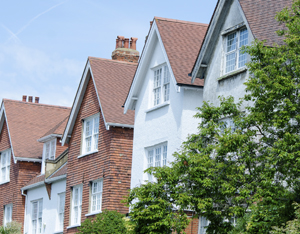An Indianapolis-based home builder and two trade associations have filed a lawsuit against Greenwood, claiming the city has adopted architectural standards on new houses that will drive up prices so significantly that the costs would preclude home ownership for thousands of residents.
A homebuilder and two central Indiana organizations have challenged Greenwood’s new rules that set standards for how new homes in the city should be built.
Arbor Homes, the Builders Association of Greater Indianapolis and the Indiana Builders Association claim in their lawsuit that the new standards will drive up prices of homes, making them too expensive for buyers looking for affordable homes, eliminate some of the floor plans the developer had offered and could make some lots unbuildable due to the standards and existing requirements that similar homes are separated in neighborhoods.
The lawsuit also says the new standards are unconstitutional, against state law and go beyond the city’s authority for zoning, according to the lawsuit filed in Johnson County Superior Court No. 1. Allegations made in a civil lawsuit are the opinion of the person filing them and may be refuted at trial.
The builder and associations are asking the court to grant an injunction, preventing the city from applying and enforcing the new standards or rejecting permit applications that don’t meet the guidelines.
“Government overreach in our communities can become a devastating problem for homeowners, limiting their choices if not immediately addressed,” Builders Association of Greater Indianapolis Chief Executive Officer Steve Lains said in a written statement.
Greenwood is vigorously disputing the allegations in the lawsuit, city engineer Mark Richards said in a statement.
“Greenwood is committed to requiring builders to construct high-quality housing at all price points so that residents are protected in what is generally their biggest investment – their homes,” Richards said in the statement.
Architectural standards are common in other communities, including Carmel and Zionsville, and protect homebuyers and home values by ensuring new homes are built with quality, the statement said.
The city’s new standards, approved last year, require certain types of materials to be used on new homes and larger lot sizes, along with other requirements, including a different pitch, or steepness, of the roof, decorative garage doors, bay windows and shutters and decorative columns on front porches.
Under the city’s rules, a developer has to follow the new guidelines if their development requires approval for a primary or secondary plat, which are detailed construction plans filed with the city.
Every developer that filed those final plans before June 2015 was grandfathered in under the old architectural standards, but if a developer planned a new section of a neighborhood, they would need additional approvals for that. And that means they would need to follow the new standards.
The lawsuit says builders are being required to follow the new standards even if they received permit approval and began development of a subdivision prior to the approval of the ordinance, and that will effect multiple developers.
Arbor Homes said it received approval from Greenwood in 2013 to build a six-section, 275-lot subdivision called Briarstone on the west side of South Emerson Avenue, between Pushville and Worthsville roads. Homes in the subdivision were designed to be affordably priced for the area, from about $130,000 to $175,000 depending on the floor plans, the builder said.
Arbor developed the first three sections of the subdivision under previous architectural guidelines, but when seeking permits to begin working on the fourth section in January, the Greenwood planning department said new design standards would apply to the remaining three sections, the lawsuit said.
The new rules would force Arbor to build homes that are incompatibly priced with the existing neighborhood, the lawsuit said. The lawsuit says the standards are completely aesthetic and will add between $15,000 and $30,000 to the sales price of a new home.
“Arbor will lose customers and have difficulty selling homes in Briarstone as they will be too expensive for the homebuyers who are in the market to buy affordable homes from Arbor,” the lawsuit said. “The homes are unlikely to appraise at full value because existing homes in Briarstone were sold at a lower price.”
In addition to higher costs for new building materials, Arbor will have to produce new floor plans, option packages and marketing materials to comply with the new standards.
“The ordinance disregards the magnitude of the investments that these builders and developers have incurred before even filing a permit application for a primary or secondary plat, and disregards their substantial investment in subdivisions that are in the process of development and construction,” the lawsuit says.
Greenwood’s new standards ensure that affordable housing is also quality housing, the city’s statement said.
If home prices do increase, that will be offset by lower maintenance and repair costs on the new homes, and higher property values, Richards said in the statement.
The standards don’t apply to plans that were already approved, the city’s statement said.
Instead, those standards would be used in sections of neighborhoods where construction has not yet started, Richards said in the statement.
“Greenwood is not retroactively applying a new ordinance to Arbor Homes, nor is the city applying the new ordinance to the subject matter of the company’s primary or secondary plats, which have been filed and approved,” Richards said in the statement.





